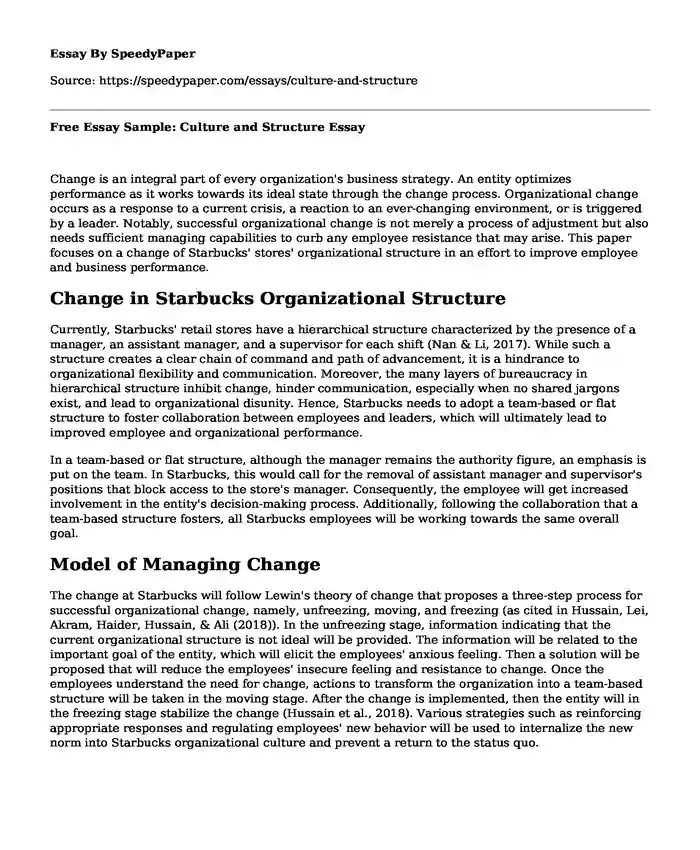
| Type of paper: | Essay |
| Categories: | Starbucks Strategic management Business strategy |
| Pages: | 4 |
| Wordcount: | 829 words |
Change is an integral part of every organization's business strategy. An entity optimizes performance as it works towards its ideal state through the change process. Organizational change occurs as a response to a current crisis, a reaction to an ever-changing environment, or is triggered by a leader. Notably, successful organizational change is not merely a process of adjustment but also needs sufficient managing capabilities to curb any employee resistance that may arise. This paper focuses on a change of Starbucks' stores' organizational structure in an effort to improve employee and business performance.
Change in Starbucks Organizational Structure
Currently, Starbucks' retail stores have a hierarchical structure characterized by the presence of a manager, an assistant manager, and a supervisor for each shift (Nan & Li, 2017). While such a structure creates a clear chain of command and path of advancement, it is a hindrance to organizational flexibility and communication. Moreover, the many layers of bureaucracy in hierarchical structure inhibit change, hinder communication, especially when no shared jargons exist, and lead to organizational disunity. Hence, Starbucks needs to adopt a team-based or flat structure to foster collaboration between employees and leaders, which will ultimately lead to improved employee and organizational performance.
In a team-based or flat structure, although the manager remains the authority figure, an emphasis is put on the team. In Starbucks, this would call for the removal of assistant manager and supervisor's positions that block access to the store's manager. Consequently, the employee will get increased involvement in the entity's decision-making process. Additionally, following the collaboration that a team-based structure fosters, all Starbucks employees will be working towards the same overall goal.
Model of Managing Change
The change at Starbucks will follow Lewin's theory of change that proposes a three-step process for successful organizational change, namely, unfreezing, moving, and freezing (as cited in Hussain, Lei, Akram, Haider, Hussain, & Ali (2018)). In the unfreezing stage, information indicating that the current organizational structure is not ideal will be provided. The information will be related to the important goal of the entity, which will elicit the employees' anxious feeling. Then a solution will be proposed that will reduce the employees' insecure feeling and resistance to change. Once the employees understand the need for change, actions to transform the organization into a team-based structure will be taken in the moving stage. After the change is implemented, then the entity will in the freezing stage stabilize the change (Hussain et al., 2018). Various strategies such as reinforcing appropriate responses and regulating employees' new behavior will be used to internalize the new norm into Starbucks organizational culture and prevent a return to the status quo.
Resistance to Change
Often, leaders championing change neglect the human factor, a situation that leads to resistance to change. Since change within the entity will require new ways of doing things, employees' habits may become a substantial obstruction on the way of change. Mainly, employees may resist a change because of fear of losing the job, uncomfortable with the new environment, and fear of losing authority (Holloway, Romme, & Demerouti, 2018). Unless leaders explain the benefits of the change comprehensively, employee resistance can slow down the development and adaptation of the new structure.
Therefore, to prevent the harmful effect of resistance to change, a leader has several options to manage the change in a positive way. First, the leader must embrace effective and active communication since clear, honest and transparent communication, concerning the need for change, is crucial to successful organizational change. Moreover, the employees need to understand the vision for change. Second, the leader must involve employees in the change process to obtain their support and understanding of the collective effort required to make the change. Finally, the leader can use positive motivation such as financial incentives. Positive motivation establishes a high moral and personal development of employees at shaping organizational climate for high performance (Holloway, Romme, & Demerouti, 2018).
In summary, for Starbucks to achieve its goal of growth and expansion, it needs to adopt a team-based or flat structure that will improve employee and business performance. Using Lewin's model of organizational change will help the entity achieve the desired change successfully. Notwithstanding, employee resistance to change may be an obstacle in the change process but the company can overcome it through active communication, employee engagement, and positive motivation.
References
Holloway, S. S., Romme, A. G. L., & Demerouti, E. (2018). Crafting values in organizational change processes. International Journal of Social Sciences Perspectives, 3(1), 7-20. https://pure.tue.nl/ws/portalfiles/portal/106594229/71_Article_Text_132_1_10_20180918.pdf
Hussain, S. T., Lei, S., Akram, T., Haider, M. J., Hussain, S. H., & Ali, M. (2018). Kurt Lewin's change model: A critical review of the role of leadership and employee involvement in organizational change. Journal of Innovation & Knowledge, 3(3), 123-127. https://doi.org/10.1016/j.jik.2016.07.002
Nan, Y., & Li, X. (2017, April). Analysis of the Importance of Enterprise Culture on Consumer Behavior: An Example of Starbucks. In 7th International Conference on Education, Management, Information and Mechanical Engineering (EMIM 2017). Atlantis Press
Cite this page
Free Essay Sample: Culture and Structure. (2022, Dec 15). Retrieved from https://speedypaper.net/essays/culture-and-structure
Request Removal
If you are the original author of this essay and no longer wish to have it published on the SpeedyPaper website, please click below to request its removal:
- Culture and Social Norms of the Ancient Greeks - Essay Example
- Free Essay Sample on Developing a Health Advocacy Campaign
- List of Supplementary Resources on e-Commerce, Paper Sample
- Leadership Essay Example on the Role Played Within a Group
- Essay Sample on Organizational Development
- Literary Analysis Essay on Prague Spring by Simon Mawer
- Atlas International Business Case: Globalization and Economic Indicators for the Scrap Metal Recycling Industry
Popular categories




